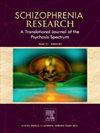Sleep quality, psychological resilience, family resilience, social support, and mental disability in patients with chronic schizophrenia: A cross-sectional study
IF 3.6
2区 医学
Q1 PSYCHIATRY
引用次数: 0
Abstract
After the remission of psychotic symptoms in patients with chronic schizophrenia, a persistently high rate of disability suggests potential influences from socio-ecological factors. This study aimed to explore the complex relationships between socioecological factors, including sleep quality, psychological resilience, family resilience, and social support, and the severity of psychiatric disability in patients with chronic schizophrenia. Employing a cross-sectional design, the study involved 188 individuals with chronic schizophrenia. Disability was measured using the World Health Organization Disability Assessment Schedule 2.0 (WHO-DAS 2.0), while social support, family resilience, psychological resilience, and sleep quality were assessed using the Social Support Rating Scale (SSRS), Family Hardiness Index (FHI), Connor-Davidson Resilience Scale (CD-RISC), and Pittsburgh Sleep Quality Index (PSQI), respectively. LASSO regression and structural equation modeling (SEM) analyses were conducted to identify predictive factors and their interrelationships. The mean WHO-DAS 2.0 score of 72.91 ± 14.04 indicated substantial difficulties in daily activities, necessitating comprehensive support among participants. LASSO regression identified frequent disease relapses, low education levels, and poor sleep quality as risk factors for disability, whereas strong social support, family resilience, and individual resilience emerged as protective factors against disability. SEM demonstrated that the enhancement of family and individual resilience by social support contributes to the mitigation of disability. The study underscores the critical roles of social support, family resilience, and individual psychological resilience in reducing disability in patients with chronic schizophrenia, suggesting that interventions targeting these factors may improve rehabilitation outcomes.
慢性精神分裂症患者的睡眠质量、心理复原力、家庭复原力、社会支持和精神残疾:横断面研究
慢性精神分裂症患者的精神症状缓解后,其残疾率仍居高不下,这表明社会生态因素可能对其产生影响。本研究旨在探讨睡眠质量、心理复原力、家庭复原力和社会支持等社会生态因素与慢性精神分裂症患者精神残疾严重程度之间的复杂关系。研究采用横断面设计,共涉及 188 名慢性精神分裂症患者。残疾程度采用世界卫生组织残疾评估表 2.0(WHO-DAS 2.0)进行测量,而社会支持、家庭复原力、心理复原力和睡眠质量则分别采用社会支持评定量表(SSRS)、家庭坚韧性指数(FHI)、康纳-戴维森复原力量表(CD-RISC)和匹兹堡睡眠质量指数(PSQI)进行评估。通过 LASSO 回归和结构方程模型(SEM)分析,确定了预测因素及其相互关系。WHO-DAS 2.0 的平均得分为 72.91 ± 14.04,这表明参与者在日常活动中存在很大困难,需要全面的支持。LASSO 回归发现,疾病频繁复发、教育水平低和睡眠质量差是导致残疾的风险因素,而强大的社会支持、家庭复原力和个人复原力则是防止残疾的保护因素。SEM 表明,社会支持对家庭和个人复原力的增强有助于减轻残疾。该研究强调了社会支持、家庭复原力和个人心理复原力对减少慢性精神分裂症患者残疾的关键作用,表明针对这些因素的干预措施可改善康复效果。
本文章由计算机程序翻译,如有差异,请以英文原文为准。
求助全文
约1分钟内获得全文
求助全文
来源期刊

Schizophrenia Research
医学-精神病学
CiteScore
7.50
自引率
8.90%
发文量
429
审稿时长
10.2 weeks
期刊介绍:
As official journal of the Schizophrenia International Research Society (SIRS) Schizophrenia Research is THE journal of choice for international researchers and clinicians to share their work with the global schizophrenia research community. More than 6000 institutes have online or print (or both) access to this journal - the largest specialist journal in the field, with the largest readership!
Schizophrenia Research''s time to first decision is as fast as 6 weeks and its publishing speed is as fast as 4 weeks until online publication (corrected proof/Article in Press) after acceptance and 14 weeks from acceptance until publication in a printed issue.
The journal publishes novel papers that really contribute to understanding the biology and treatment of schizophrenic disorders; Schizophrenia Research brings together biological, clinical and psychological research in order to stimulate the synthesis of findings from all disciplines involved in improving patient outcomes in schizophrenia.
 求助内容:
求助内容: 应助结果提醒方式:
应助结果提醒方式:


